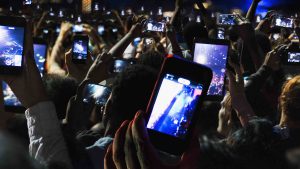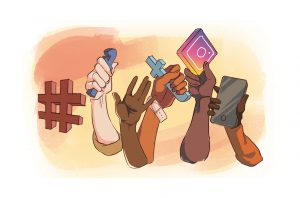From Katya: This episode is more than a bit overdue but it’s especially pervading online culture right now: online activism. The internet has unquestionably opened up historic new options for sharing information, fund raising, and promoting causes and events. But for smart phones and the internet, most of us would not know the names of George Floyd, Breonna Taylor, or numerous others. This is another topic that’s going to spill into a couple of episodes on different facets of the issue but for starters we want to address online activism and protest.
My feelings about this are complicated to say the least. I’m someone that posts about social issues on my own media feed and uses social media to keep up with activists and causes I care about. My engagement with social media is primarily about keeping myself informed and sharing information with folks in my circle. This isn’t activism nor, in my opinion, does it constitute substantive or meaningful action. Which isn’t to say it isn’t without value; online platforms like Instagram, Facebook, and Reddit are often how I figure out what actions I can be taking whether signing petitions, calling representatives, donating money, or figuring out the next protest to attend. It’s also a potentially powerful tool for organizers. Hannah and my union often used online platforms to spread the word internally and externally about petitions, events, and now – from half a country away – I can keep tabs on my union through our Slack channel.
The problem with participating in movements virtually is that it allows people to do a bare minimum of a performative action without substantively engaging with an issue. A viral example is the ALS Bucket Challenge in 2014 in which participants dumped a bucket of ice water on their heads to share on social media to raise awareness and money about ALS. Participants were typically nominated by someone else and supposed to nominate others to keep the viral chain going. As an instance of viral marketing, it was quite impressive and raised over $220 million globally. However the campaign faced criticism over whether or not it was much more than a marketing gimmick.
Sustained, prolonged engagement is basically the dream of any ongoing effort to raise money, awareness, or instigate change. Viral virtual protest movements like this – or the more recent Blackout Tuesday – eventually burn themselves out because that’s what viral internet phenomena do. Many critics of the Bucket Challenge point out that most participants knew little about ALS or the organizations they were donating to. Without much personal investment in the cause, the majority of donations were one-time events rather than the smaller but steady investments that sustain non-profit organizations (sometimes accidentally poaching revenue from other organizations.)
Critics also noted that the challenge allowed participants to engage – wittingly or not – in moral licensing which is a phenomenon where individuals past positive actions enable later bad behavior. Sort of the moral equivalent of dieting hard so you don’t feel ‘bad’ about eating cookies. Like dieting, however, this leads to a crash cycle that repeats itself.
The short version is that sustained action and attention is hard and demands effort. But an easy one time re-post or dumping a bucket of water over my head? That’s comparatively easy. I get to engage in an easy version of altruism and action that doesn’t demand my educating myself or committing myself to a cause. I get to signal my performative ‘goodness’ to others when it’s trending, justifying my relapsing into inaction when it’s no longer the social media topic du jour.
That doesn’t mean every post or online action by someone that isn’t a full time activist online is inconsequential or meaningless. Social media goes through topic cycles, whether in response to activism or the latest meme. For better or worse, it’s the digital media cycle we live in. Bursts of interest and activity are important and often enabled by the internet, but the problem is often that the internet media landscape influences our everyday behavior IRL (and we’ll talk about the false division that this is) such that the boom and bust cycles of demands for change based on the internet define how many engauge with social movements.
So what is your experience with online activism or protests? How do you feel about these movements, especially now during covid-19? What other questions do you have about internet, tech, and organizing?









Katya is young, idealistic, and dedicated to changing a lot of things that are wrong with society. I like that. She might be described as revolutionary. I’m old (59), tired, and I got a lot on my plate. Without the online activism, I’m not getting involved. But the movement still needs the weekend warriors. We’re doing what we can. It doesn’t mean we smugly congratulate ourselves for sending $5 once in a while, then settling back into old habits. It just means we don’t have the energy of the young. I tell my kids to vote, goddammit, and get my generation out of power.